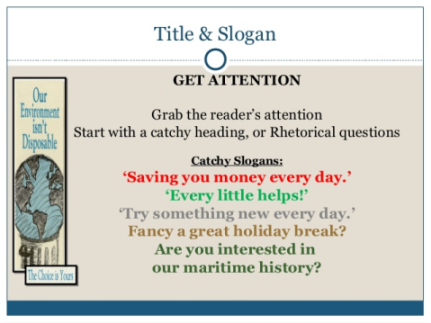I’d like to take up a very interesting question that not only concerns English usage but also touches on the nature of language itself. It was posted in the Forum sometime ago by member Miss Mae.
Here’s her question:
“Why can some slogans (like the ones below) make you flinch?
“Of a bank:
‘We do banking, you do life.’“Of a music bar:
‘Why would you go anywhere else but Boracay?’“Why do they seem wrong, sir? And what must be done to correct them?”
Here’s my reply to Miss Mae:A slogan is meant to be a novel, attention-getting expression of what’s usually an obvious, self-explanatory idea or premise. To drive home its point, a slogan makes clever use of a suitable rhetorical device to emotionally connect to the readers or listeners and circumvent—short-circuit, if you will—their rational thought process. It’s intended to ambush the mind into acquiescence.
In particular, the bank slogan you presented, “We do banking, you do life,” uses the rhetorical device known as
repetition—it repeats the key word “do” in two parallel clauses to reinforce the emotional appeal of this otherwise bland, matter-fact statement, “You can enjoy life better by banking with us.” On the other hand, that music bar slogan, “Why would you go anywhere else but Boracay?”, uses the device known as the
rhetorical question—asking a leading question for which no rational answer or objection is expected, only the involuntary assent of the reader or listener.
Now to your first question: Why do those slogans seem wrong? Upon inspection, we’ll find that there’s really nothing grammatically, semantically, or structurally wrong with them; they only seem wrong because their wording deliberately departs from the humdrum, unmemorable way their idea or proposition is usually expressed. In short, they are crafted for their quiet shock value, the better to circumvent any rational objections to them. In the case of effective slogans, though, acceptance of their idea or proposition usually follows as soon as the shock wears off.

This brings us to your next question: What must be done to correct those two slogans? Nothing really by way of better English, for the English of those slogans is airtight. The way they say things may make you flinch and may rankle your sensibility for a while, but ultimately, their success as slogans will be measured by how well you remember and accept them—and allow them to steer your purchase or strategic decisions in the direction they suggest.
***
And here’s another interesting question, this time from Forum member who calls herself English Maiden:
Is there any difference between these two sentences?
1. “I hope you will change your mind.”
2. “I hope you change your mind.”
My reply to English Maiden:I would say that the difference in meaning between those two sentences is slight.
We must keep in mind that both are elliptical constructions of the same sentence, “I hope that you will change your mind.” That sentence is, of course, a complex sentence consisting of the main clause “I hope” in the present tense and the subordinate relative clause “that you will change your mind” in the future tense.
In Sentence #1 above, only the relative pronoun “that” is ellipted or dropped, while in Sentence #2, both “that” and the auxiliary verb “will” are ellipted from the relative clause. Both ways, the meaning of the original sentence isn’t significantly altered.
The slight perceivable difference between the two sentences is that in Sentence #1, the speaker hopes that the person being addressed will have a change of mind sometime in the indeterminate future, while in Sentence #2, the speaker hopes that the person being addressed will have a change of mind right away or not long after the hope is expressed.
(2011)This essay, 765th in the series, first appeared in the column “English Plain and Simple” by Jose A. Carillo in the November 12, 2011 issue of The Manila Times
, © 2012 by the Manila Times Publishing Corp. All rights reserved.